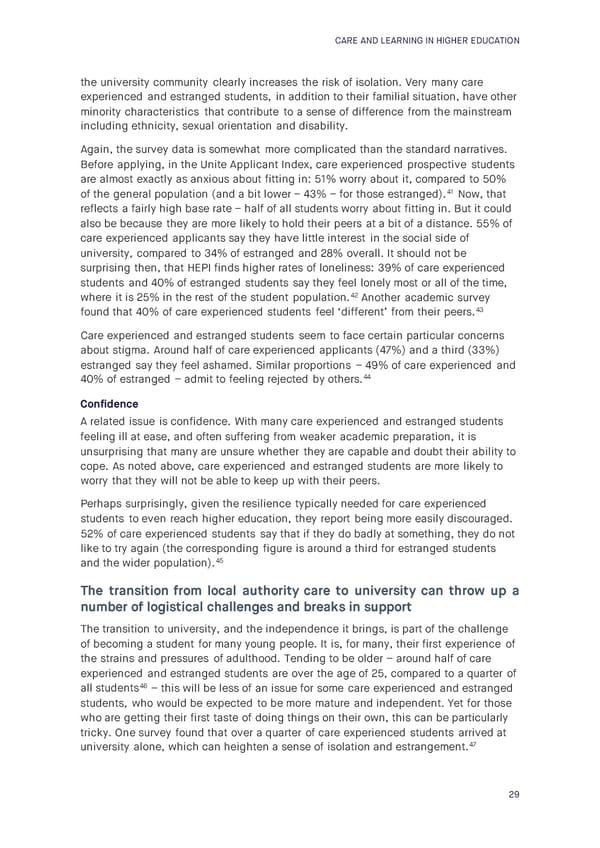CARE AND LEARNING IN HIGHER EDUCATION the university community clearly increases the risk of isolation. Very many care experienced and estranged students, in addition to their familial situation, have other minority characteristics that contribute to a sense of difference from the mainstream including ethnicity, sexual orientation and disability. Again, the survey data is somewhat more complicated than the standard narratives. Before applying, in the Unite Applicant Index, care experienced prospective students are almost exactly as anxious about fitting in: 51% worry about it, compared to 50% of the general population (and a bit lower – 43% – for those estranged).41 Now, that reflects a fairly high base rate – half of all students worry about fitting in. But it could also be because they are more likely to hold their peers at a bit of a distance. 55% of care experienced applicants say they have little interest in the social side of university, compared to 34% of estranged and 28% overall. It should not be surprising then, that HEPI finds higher rates of loneliness: 39% of care experienced students and 40% of estranged students say they feel lonely most or all of the time, where it is 25% in the rest of the student population.42 Another academic survey found that 40% of care experienced students feel ‘different’ from their peers.43 Care experienced and estranged students seem to face certain particular concerns about stigma. Around half of care experienced applicants (47%) and a third (33%) estranged say they feel ashamed. Similar proportions – 49% of care experienced and 44 40% of estranged – admit to feeling rejected by others. Confidence A related issue is confidence. With many care experienced and estranged students feeling ill at ease, and often suffering from weaker academic preparation, it is unsurprising that many are unsure whether they are capable and doubt their ability to cope. As noted above, care experienced and estranged students are more likely to worry that they will not be able to keep up with their peers. Perhaps surprisingly, given the resilience typically needed for care experienced students to even reach higher education, they report being more easily discouraged. 52% of care experienced students say that if they do badly at something, they do not like to try again (the corresponding figure is around a third for estranged students and the wider population).45 The transition from local authority care to university can throw up a number of logistical challenges and breaks in support The transition to university, and the independence it brings, is part of the challenge of becoming a student for many young people. It is, for many, their first experience of the strains and pressures of adulthood. Tending to be older – around half of care experienced and estranged students are over the age of 25, compared to a quarter of all students46 – this will be less of an issue for some care experienced and estranged students, who would be expected to be more mature and independent. Yet for those who are getting their first taste of doing things on their own, this can be particularly tricky. One survey found that over a quarter of care experienced students arrived at 47 university alone, which can heighten a sense of isolation and estrangement. 29
 Care and Learning in Higher Education Page 29 Page 31
Care and Learning in Higher Education Page 29 Page 31